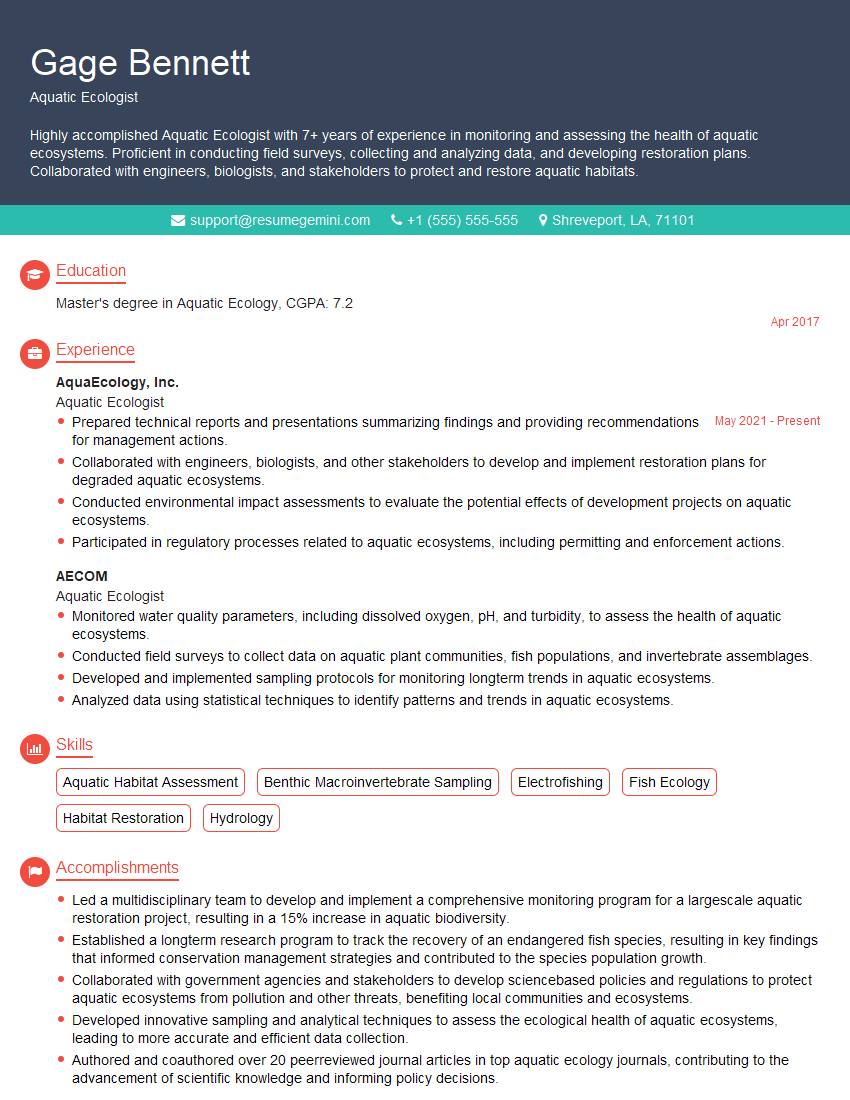Are you a seasoned Aquatic Ecologist seeking a new career path? Discover our professionally built Aquatic Ecologist Resume Template. This time-saving tool provides a solid foundation for your job search. Simply click “Edit Resume” to customize it with your unique experiences and achievements. Customize fonts and colors to match your personal style and increase your chances of landing your dream job. Explore more Resume Templates for additional options.

Gage Bennett
Aquatic Ecologist
Summary
Highly accomplished Aquatic Ecologist with 7+ years of experience in monitoring and assessing the health of aquatic ecosystems. Proficient in conducting field surveys, collecting and analyzing data, and developing restoration plans. Collaborated with engineers, biologists, and stakeholders to protect and restore aquatic habitats.
Education
Master’s degree in Aquatic Ecology
April 2017
Skills
- Aquatic Habitat Assessment
- Benthic Macroinvertebrate Sampling
- Electrofishing
- Fish Ecology
- Habitat Restoration
- Hydrology
Work Experience
Aquatic Ecologist
- Prepared technical reports and presentations summarizing findings and providing recommendations for management actions.
- Collaborated with engineers, biologists, and other stakeholders to develop and implement restoration plans for degraded aquatic ecosystems.
- Conducted environmental impact assessments to evaluate the potential effects of development projects on aquatic ecosystems.
- Participated in regulatory processes related to aquatic ecosystems, including permitting and enforcement actions.
Aquatic Ecologist
- Monitored water quality parameters, including dissolved oxygen, pH, and turbidity, to assess the health of aquatic ecosystems.
- Conducted field surveys to collect data on aquatic plant communities, fish populations, and invertebrate assemblages.
- Developed and implemented sampling protocols for monitoring longterm trends in aquatic ecosystems.
- Analyzed data using statistical techniques to identify patterns and trends in aquatic ecosystems.
Accomplishments
- Led a multidisciplinary team to develop and implement a comprehensive monitoring program for a largescale aquatic restoration project, resulting in a 15% increase in aquatic biodiversity.
- Established a longterm research program to track the recovery of an endangered fish species, resulting in key findings that informed conservation management strategies and contributed to the species population growth.
- Collaborated with government agencies and stakeholders to develop sciencebased policies and regulations to protect aquatic ecosystems from pollution and other threats, benefiting local communities and ecosystems.
- Developed innovative sampling and analytical techniques to assess the ecological health of aquatic ecosystems, leading to more accurate and efficient data collection.
- Authored and coauthored over 20 peerreviewed journal articles in top aquatic ecology journals, contributing to the advancement of scientific knowledge and informing policy decisions.
Awards
- Received the Early Career Scientist Award from the Society for Freshwater Science for outstanding contributions to aquatic ecology research.
- Awarded the Excellence in Science Communication Award from the American Fisheries Society for effectively translating complex ecological concepts to the public.
- Recognized with the Best Poster Award at the International Conference on Aquatic Ecosystem Health for innovative research on the effects of climate change on aquatic ecosystems.
- Recognized with the Outstanding Contribution Award from the North American Benthological Society for exceptional research on the ecology of aquatic invertebrates.
Certificates
- Certified Fisheries Professional (CFP)
- Certified Lake Manager (CLM)
- Certified Stream Habitat Assessment Specialist (SHAS)
- First Aid and CPR
Career Expert Tips:
- Select the ideal resume template to showcase your professional experience effectively.
- Master the art of resume writing to highlight your unique qualifications and achievements.
- Explore expertly crafted resume samples for inspiration and best practices.
- Build your best resume for free this new year with ResumeGemini. Enjoy exclusive discounts on ATS optimized resume templates.
How To Write Resume For Aquatic Ecologist
- Highlight your field experience and data analysis skills.
- Demonstrate your understanding of aquatic ecology and restoration techniques.
- Showcase your ability to communicate technical information effectively.
- Tailor your resume to the specific requirements of each job you apply for.
Essential Experience Highlights for a Strong Aquatic Ecologist Resume
- Monitored water quality parameters including dissolved oxygen, pH, and turbidity to assess ecosystem health.
- Conducted field surveys of aquatic plant communities, fish populations, and invertebrate assemblages.
- Developed and implemented sampling protocols to monitor long-term trends in aquatic ecosystems.
- Analyzed data using statistical techniques to identify patterns and trends in aquatic ecosystems.
- Prepared technical reports and presentations summarizing findings and providing recommendations for management actions.
- Collaborated with engineers, biologists, and other stakeholders to develop and implement restoration plans for degraded aquatic ecosystems.
Frequently Asked Questions (FAQ’s) For Aquatic Ecologist
What is the role of an Aquatic Ecologist?
Aquatic Ecologists study the interactions between organisms and their aquatic environment. They monitor water quality, conduct field surveys, and develop restoration plans to protect and restore aquatic ecosystems.
What are the educational requirements for an Aquatic Ecologist?
Most Aquatic Ecologists have a Master’s degree in Aquatic Ecology, Biology, or a related field.
What are the key skills for an Aquatic Ecologist?
Key skills for Aquatic Ecologists include field sampling, data analysis, report writing, and restoration planning.
What is the job outlook for Aquatic Ecologists?
The job outlook for Aquatic Ecologists is expected to be good over the next decade.
What are the salary expectations for Aquatic Ecologists?
The salary expectations for Aquatic Ecologists vary depending on experience and location, but the average salary is around $65,000 per year.
What are the career advancement opportunities for Aquatic Ecologists?
Aquatic Ecologists can advance their careers by pursuing management positions, becoming certified, or specializing in a particular area of aquatic ecology.